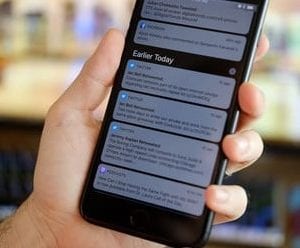A text message from your boyfriend. An email alerting you to a sale at Sephora. A news update.
The ping and illumination of our small screens, the ones permanently attached to our hands like a sixth finger, is the modern day, digital high. It triggers a visceral, physical response in our bodies and in our brains.
Notifications keep us up to date with friends and family. For many of us, it’s a critical mode of communication and a required part of our jobs. But notification alerts are also increasing our stress levels and compromising our productivity.
Most notifications that pop up on our phones are not urgent, which undermines the whole idea of an alert being something important or requires our immediate attention.
OUR NEED TO BELONG
Many people keep their notifications on to feel a sense of belonging and community. I’m part of several Whatsapp group chats, and I know when the alerts begin popping up on my phone, a night alone at home can suddenly feel less lonely and prosaic. (I now turn off all notifications, except missed phone calls)
Notification alerts are the equivalent to a tug on the shoulder at a crowded party. You get that same feeling. I’m important! Somebody has sought me out! Somebody wants my attention! It can feel validating. It can also be a symptom of FOMO: fear of missing out. And let’s face it, who hasn’t suffered from that in one form or another?
We all want to feel like we belong and with modern technology demanding us to have a digital presence, our ways of connecting are altering in new and frightening ways.
Notifications symbolize the conflicting nature of the web: they engage us in interesting ways, but they can also isolate us and take us away from the real world.
As Jia Tolentino writes in her forthcoming book ‘Trick Mirror’, ‘The internet provides a cheap substitute: it gives us brief moments of pleasure and connection, tied up in the opportunity to constantly listen and speak.’
HEALTH HAZARD?
Distractions are never a good thing during the work-day. And worse than compromised productivity is the fact that notifications are contributing to an increase in stress. Various health problems have amplified since the invention of the smartphone.
According to psychology researcher Larry Rosen at the California State University, app makers use behavioural science in their designs. ‘The bottom line is, it’s a business,’ he says.
Rosen, who cowrote The Distracted Mind, told WIRED that the chemical reactions we feel upon getting a notification include ‘sweaty palms, queasiness, and if you’re getting them over and over, beeps, buzzes, vibrations, all of those are contributing to ongoing chemical stress.’
Gloria Mark studies digital interruptions at the University of California and researches the effects of instant messages on our brains. According to Mark, after you are disrupted by a notification, ‘it takes about 25 minutes to get back to the original task’.
25 minutes? That’s enough to scare me into not looking at my phone at all during the day.
If you’re like most people I know, you’re cognitively burdened, which according to Mark, contributes to stress.
WHAT TO DO?
There are a few technological solutions. StayFocusd turns off Twitter after 45-minutes of daily use. There’s another app called Freedom, which blocks social media during the day.
I try the most organic, fuss-free method: I turn my phone face down at my desk during working hours. If there’s an urgent phone call, I can feel it vibrate on the table. I turn off all my notifications and designate blocks of 15 to 30 minutes per day for social media use. I rarely overstretch.
It’s also useful to look at the built-in dashboards on your phone that tells you how many minutes per day you’ve looked at your phone. (This can shock you into drawing up some boundaries).
Lauren Goode from WIRED hopes that in the future AI might be smart enough to better determine which notifications are worthy enough to actually interrupt us.
Mark believes in a balance of technology and self-discipline: ‘I see an opportunity, ironically, for developing technology to help people deal with technology. People can learn, and be empowered to learn to resist notifications’.



